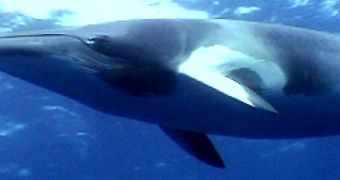The International Whaling Commission (IWC) is so keen at promoting a compromise between nations opposing and countries favoring whaling that it appears to forget why it was set up in the first place. This was made obvious in a proposal that the organization released about five days ago, in which a number of new “ideas” are being set forth. Some of them include setting small quotas for commercial whaling, which officials hope that will attract Japan, Norway and Iceland. However, determining the maximum allowable catch is still a matter of debate, Nature News reports.
In order to have an enforceable agreement, the international community needs to have all countries agree on a baseline. This is precisely what the IWC is trying to do at this point, but on a sketchy background, critics say. For many whale populations, they add, long-term statistics are not available, and data on actual numbers and spawning trends are mission entirely. Under such circumstances, setting “sustainable” hunting quotas for these species is impossible. But the IWC proposal does include a few of these assessments, which were established for political reasons, and have nothing to do with science.
Japan, Iceland and Norway have been in blatant defiance of a UN agreement banning commercial whaling since 1986. In the 24 years that passed, they caught more than 33,000 whales, which ended up being sold for profit. Supporters of the Japanese Institute of Cetacean Research (ICR) have argued that many research papers were produced by researchers in this nation following lethal whale studies. That is a bold lie, as the contribution of Japanese experts to this field of research could have been a lot more significant if they were actually doing science on the whale meat, rather than selling it in supermarkets.
The new proposal should in theory provide the IWC with the tools it needs to start enforcing international law, and stop being a puppet organization. But its efforts are misguided, and include provisions set forth by political and economic interest, even before researchers finished their surveys of whale populations. Scientists say that a few more years will pass until they have a clear picture of the situation these animals are in. It's only then, after analyzing the rates at which the whales multiply, will they be able to set sustainable catch quotas for countries that could sign the new document. It will be presented at the IWC annual meeting, which will be held in Agadir, Morocco, this June.

 14 DAY TRIAL //
14 DAY TRIAL //